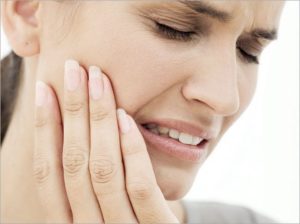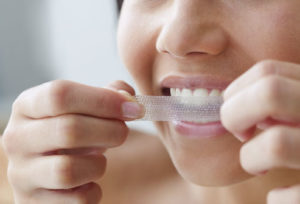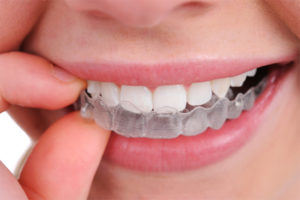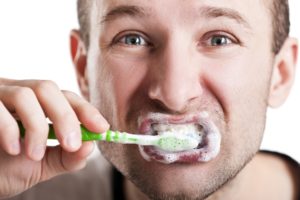 There are many different causes for tooth sensitivity. Teeth are considered sensitive when you have something hot, cold, sour or sweet and it causes sensitivity, discomfort or even pain, ranging from a quick zing to a lasting throbbing feeling.
There are many different causes for tooth sensitivity. Teeth are considered sensitive when you have something hot, cold, sour or sweet and it causes sensitivity, discomfort or even pain, ranging from a quick zing to a lasting throbbing feeling.
Unfortunately this is quite a common problem that people suffer from. We’ve listed the different causes below to help you prevent tooth sensitivity in the future or help you narrow down the reason for sensitivity you may be experiencing today.
1. Over using mouthwash.
 When used properly, mouthwash is a great tool for helping to keep the oral cavity healthy. However, mouthwash is a strong cleaning agent and can wear away at enamel, effecting the strength and sensitivity of your teeth. Similar effects can be seen as when patients eat acidic foods. If you are currently using mouthwash twice daily, try cutting back to one time per day. This may help the sensitivity and prevent pain.
When used properly, mouthwash is a great tool for helping to keep the oral cavity healthy. However, mouthwash is a strong cleaning agent and can wear away at enamel, effecting the strength and sensitivity of your teeth. Similar effects can be seen as when patients eat acidic foods. If you are currently using mouthwash twice daily, try cutting back to one time per day. This may help the sensitivity and prevent pain.
2. You may have gum disease.
If it has been a long time since your last thorough checkup and cleaning, it is possible you have gum disease. When the bacteria that causes gum disease is present, it will cause the gums to recede. This may happen on just one or a couple teeth, or throughout an entire area of the mouth. Once the gums recede, this exposes the part of the tooth that does NOT have enamel, the root. Almost anything that contacts the root of the tooth will irritate the inside nerve, the pulp, and cause sensitivity.
3.Your Diet
 If you eat a large quantity of acidic foods then this will absolutely lead to sensitivity. The acids in the food will erode the enamel and expose the underlying layer, the dentin. This especially will happen if you brush right after eating the acidic foods. Some examples of acidic foods are citrus fruits, wine, sour food, and many tomato products. After consuming something high in acid the best thing to do is rinse with water. After rinsing, wait at least 30 minutes before brushing to ensure that your enamel has time to remineralize and restore the pH of your mouth.
If you eat a large quantity of acidic foods then this will absolutely lead to sensitivity. The acids in the food will erode the enamel and expose the underlying layer, the dentin. This especially will happen if you brush right after eating the acidic foods. Some examples of acidic foods are citrus fruits, wine, sour food, and many tomato products. After consuming something high in acid the best thing to do is rinse with water. After rinsing, wait at least 30 minutes before brushing to ensure that your enamel has time to remineralize and restore the pH of your mouth.
4.You have a deep cavity that is communicating with the nerve inside the tooth.
Cavities can start from outside or inside of the tooth. When this happens it will not usually cause pain until it has gotten large and into the nerve of the tooth. As this worsens it will become more and more sensitive. Ideally you can catch these types of cavities before a root canal or more serious treatment is needed. Many times this can be treated very straightforward with root canal therapy. Contact Dr. Ken Cirka or Dr. Jessica Meier right away for evaluation.
5.You whitened your teeth.
 When we whiten our teeth sometimes this can cause additional sensitivity. Make sure to use a desensitizing toothpaste to avoid this when you plan to whiten. They work very well when used exclusively and not in combination with other toothpastes. Also be sure to read the instructions thoroughly. Excessive gel in the at home whitening kits can cause sensitivity on not only the teeth but on the gums too.
When we whiten our teeth sometimes this can cause additional sensitivity. Make sure to use a desensitizing toothpaste to avoid this when you plan to whiten. They work very well when used exclusively and not in combination with other toothpastes. Also be sure to read the instructions thoroughly. Excessive gel in the at home whitening kits can cause sensitivity on not only the teeth but on the gums too.
6.You may have a tooth that is fractured.
If one of your teeth has a fracture, the crack can extend through the enamel and into the more sensitive parts of the tooth. Even cold air from taking a deep breath can stimulate sensitivity in some cases. See your dentist immediately to discuss proper treatment for your situation.
7.You grind and/or clench your teeth.
 This very common condition is known as bruxism. Often patients do not even know if they are doing any clenching or grinding throughout the night because it will not wake them up. However aside from sensitivity, these actions can cause fractures and other serious problems for your teeth. It is important to ask your dentist or dental hygienist if they see signs of this so they can fabricate you a nightguard.
This very common condition is known as bruxism. Often patients do not even know if they are doing any clenching or grinding throughout the night because it will not wake them up. However aside from sensitivity, these actions can cause fractures and other serious problems for your teeth. It is important to ask your dentist or dental hygienist if they see signs of this so they can fabricate you a nightguard.
8.Recent Dental Work.
It can take teeth sometimes up to 6 weeks to heal and readjust after dental work. If you experience sensitivity, just give your teeth some time to see if it passes. Maintain proper hygiene and if needed take Ibuprofen to decrease the inflammation. If the pain persists, you may need to see your doctor for an adjustment.
9.You brush too often and/or too hard.
 The best way to remove plaque is by brushing, however, it must be done properly. If you are doing it incorrectly it will led to sensitive teeth. Make sure that your toothbrush has soft bristles and you are not brushing more than three times per day. If you are brushing too much, especially right after eating a meal with acidic foods, this can break down enamel. Brushing too hard can also cause gum recession and bleeding or sensitivity. Ask your dentist or dental hygienist to instruct you on proper brushing or flossing techniques if you are unsure if this is you at your next checkup and cleaning.
The best way to remove plaque is by brushing, however, it must be done properly. If you are doing it incorrectly it will led to sensitive teeth. Make sure that your toothbrush has soft bristles and you are not brushing more than three times per day. If you are brushing too much, especially right after eating a meal with acidic foods, this can break down enamel. Brushing too hard can also cause gum recession and bleeding or sensitivity. Ask your dentist or dental hygienist to instruct you on proper brushing or flossing techniques if you are unsure if this is you at your next checkup and cleaning.
10. Your enamel is weak.
Tooth enamel can be naturally weak due to genetics or become weak over time through erosion mostly from diets high in acidic food. Use desensitizing toothpaste faithfully as it will only work to the best of its abilities if it is used exclusively.
Living with sensitive teeth is no way to enjoy life and experience eating and drinking. Getting to the root of the sensitivity is key. Schedule a visit with your dentist immediately so they can help you find out where the sensitivity is coming from and make your life more pleasant.
Contact Philadelphia Dentistry today for a free consultation to see your reasons of sensitivity and how it can best be treated.

